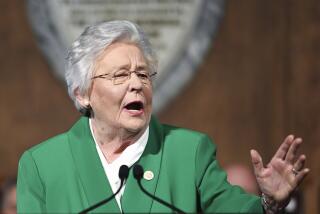Leonard Woodcock; President of United Auto Workers Union, Envoy to China
- Share via
ANN ARBOR, Mich. — Leonard Woodcock, the president of the United Auto Workers during much of the 1970s who pioneered important gains at the bargaining table and later was President Jimmy Carter’s envoy to China, has died, the union announced.
Woodcock died Tuesday night at his home in Ann Arbor from pulmonary complications. He was 89.
The son of a machine worker who also was a labor activist, Woodcock became a union member soon after college and rose through the UAW’s ranks, playing a key role in its growth into the largest industrial union in North America.
He steered negotiations that landed crucial benefits for auto workers including health and safety improvements, voluntary overtime, a dental plan and the lengthy Christmas-New Year’s paid holiday period.
He served in a variety of senior positions and was union president from 1970 to 1977.
He made his mark during a 67-day strike against General Motors Corp. in 1970 that ended with the union winning significant concessions: full cost-of-living protection for UAW members and the “30-and-out” retirement program in which 30-year industry veterans could receive full pensions regardless of their age.
“He was a leader in the fight to wipe out discrimination in jobs, housing, and all other aspects of American life,” UAW President Stephen Yokich said in a statement. “In 1961, as vice president and director of the UAW General Motors Department, he negotiated the first union contract clause barring discriminatory employment practices.”
General Motors issued a one-sentence statement, saying, “Leonard Woodcock is recognized as a truly progressive labor leader who expanded dialogue with management.”
In 1970 the UAW’s president was the legendary Walter P. Reuther, a veteran of labor disputes, civil rights marches and feminist causes.
When Reuther died in a plane crash in June 1970, Woodcock succeeded him after a closely fought battle with Douglas Fraser, who was later elected UAW chief.
“He was president at a traumatic time in the union’s history,” Fraser told The Times from his winter home in Palm Springs. “He was succeeding a legend.”
Fraser recalled that Woodcock was up to the task.
“Everyone was apprehensive because Walter was a giant. Leonard assumed the reins and steered the union on a progressive course,” Fraser said. “He always did an outstanding job. He had a considerable intellect, and broad view of the world.”
Despite his reputation as a gracious gentleman, Woodcock rankled some, particularly when he led the UAW’s 1970 negotiations with GM, said David Lewis, a professor of automotive studies at the University of Michigan Business School. “GM took that long strike and then caved in,” Lewis said. “Henry Ford II was so mad because he had taken a strike in ‘67, and GM gave back everything that Ford had gained.”
In those 1967 talks with Ford the union agreed to a cap on the cost of living allowance of 8 cents a year--a move that seemed reasonable at the time because the cost of living adjustment hadn’t exceeded that for 20 years.
“But then we had the Vietnam War-spiked inflationary period of the late 1960s, so we had to remove that cap in 1970,” Fraser said. “We had to take the strike, and Leonard negotiated it.”
After leaving the union Woodcock was tapped by Carter in 1977 to head the then-U.S. liaison office in China. When Carter normalized relations with Beijing in 1979, Woodcock became the first American ambassador after the normalization of relations, which were broken with the establishment of the Communist regime in 1949.
Relations with China continued to concern Woodcock many years after he left government service.
“He was interested right to the end,” Fraser recalled. “Last summer he was campaigning for the WTO trade agreement with China, which was not necessarily popular with the rest of the labor movement. But he had deep convictions. Based on his experiences there his theory was that as the economy develops in China, the chances are greater that democracy would arrive in the country.”
Born in Providence, R.I., Woodcock was the son of one of the first members of the Mechanics Educational Society of America, which organized skilled workers in the auto industry during the 1930s.
He was forced to quit school because of the Depression, but got a job in 1933 as a machine assembler with Borg-Warner Corp., where he first joined a union.
In 1940 Woodcock was charged with the UAW’s efforts to organize GM’s Fisher Body plant in Grand Rapids, Mich., at the time the only nonunion GM plant. That effort was successful in 1941.
After serving in a variety of UAW posts, Woodcock was picked by Reuther to be his first administrative assistant after his election as president in 1946.
In 1955 Woodcock was named head of the UAW’s most important division: the General Motors Department. He negotiated UAW GM locals’ right to forge local agreements, and to strike.
He is survived by his wife, Sharon, and his children, Leslie Catherine Woodcock Tentler of Washington, D.C.; Janet Kathleen Woodcock of Martha’s Vineyard, Mass.; and John Robert Woodcock of Los Angeles.






